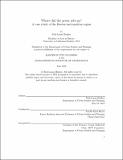Where did the green jobs go? : a case study of the Boston metropolitan region
Author(s)
Hughes, Erik-Logan
DownloadFull printable version (1.699Mb)
Other Contributors
Massachusetts Institute of Technology. Department of Urban Studies and Planning.
Advisor
Janelle Knox-Hayes.
Terms of use
Metadata
Show full item recordAbstract
The green jobs movement was a part of a nation-wide effort to address economic injustice while also directly contributing to the preservation or enhancement of environmental quality in America's urban centers. Attempts to realize the movement were seeded largely through American Recovery and Reinvestment Act funding, at a time when the United States was facing its greatest economic recession since the Great Depression. With high hopes, urban governments organized and implemented green workforce development programs with the vision of creating family-supporting, career pathways that would help address the challenges of climate change. This thesis, through the use of semi-structured interviews, analyzes how the green jobs movement began and ended in the Boston metropolitan region. My findings support that the primary reasons for the collapse of green workforce development programs were that cooperation between organizations was minimal, which resulted in duplicate programs or programs that were never fully realized. Additionally, my findings support the conclusion discussed in the literature that green jobs do not constitute a separate classication of work. Finally, the green jobs movement was not capable of alleviating the stress placed on the Bostonian labor supply by the Great Recession beginning in late 2008 and ending in 2012. The conclusion of the case study is not that the green-collar economy cannot be realized in the Boston metropolitan region. Instead, the summary findings are that progress was made towards achieving sustainable development goals, propelled predominantly by the success of the clean energy industry and the emergence of municipal energy functions. Policymakers who wish to support the growth of the green-collar economy and sustainability can do so through more coordinated efforts, utilizing the groundwork laid by the green jobs movement.
Description
Thesis: M.C.P., Massachusetts Institute of Technology, Department of Urban Studies and Planning, 2018. This electronic version was submitted by the student author. The certified thesis is available in the Institute Archives and Special Collections. Cataloged from student-submitted PDF version of thesis. "June 2018." Includes bibliographical references (pages 95-102).
Date issued
2018Department
Massachusetts Institute of Technology. Department of Urban Studies and PlanningPublisher
Massachusetts Institute of Technology
Keywords
Urban Studies and Planning.